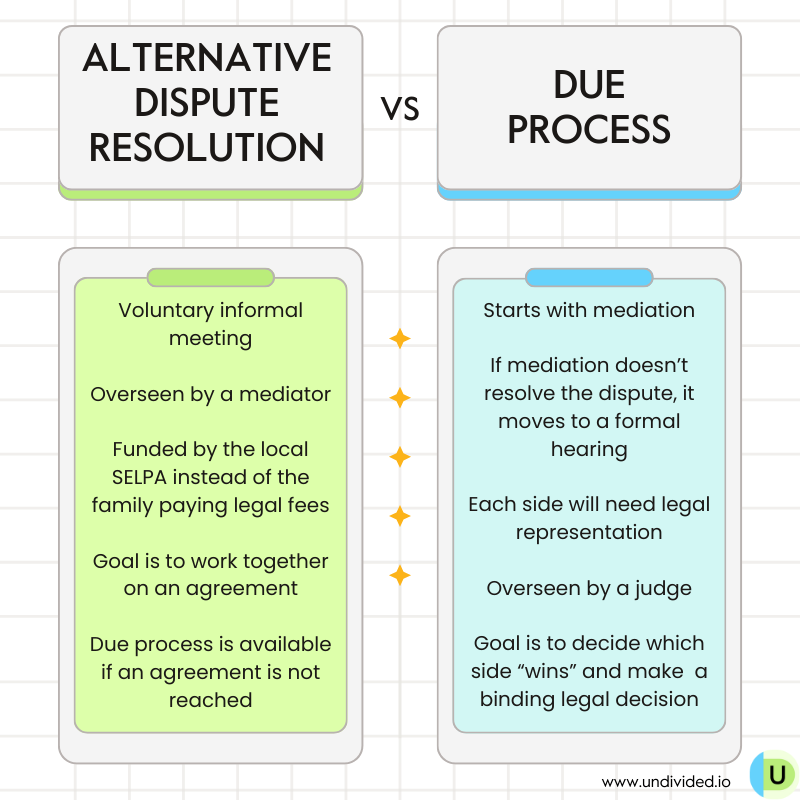Understanding your rights as a parent is vital to the IEP process. This includes your right to disagree. In an ideal world, parents and the school would be on the same page about a child’s assessments, educational placement, related services, accommodations, supports, and goals. While this is certainly possible, sometimes, no matter how great a relationship you may have with your child’s school, there will be disagreements about your child’s education and future. As parents, we all want to advocate for our kids and make sure their IEP reflects their needs, strengths, and interests in the best way, but how do we do that when it seems like we’re sitting in a room full of education experts, many of whom tell us they “know better?”
The good news: there are many procedural safeguards under IDEA available that protect the rights of children with disabilities and their parents. Many of these are essential advocacy tools that can help ensure a parent’s voice is heard. This week, we’re focusing on this parental right to disagree — and what you can do to resolve an IEP dispute.

Even if we did have a “perfect” IEP that we loved, so much of what happens in school is still out of our view as parents. So how do you know if your child’s IEP is being implemented as agreed? Find out how to make sure your child’s IEP is being followed (and find out what to do if it isn’t).

Independent Educational Evaluation. You have a right to ask for another assessment! As a parent, you can request an Independent Educational Evaluation (IEE) anytime you are in disagreement with the district’s assessment, including if you believe it wasn’t thorough enough, the results are invalid, or the district failed to assess in all areas of need. Here’s a sample letter showing how to request an IEE.
Stay Put. If you come to the end of the IEP process and are still in disagreement, should you still sign the IEP? In California, signing partially allows those parts you agree with (for example, speech services and goals) to move forward while keeping the parts you disagree with on “stay put,” which means that the areas of disagreement will follow whatever is in the previously signed IEP.
Prior Written Notice. True or false: prior written notice (PWN) is a protection afforded to parents under the procedural safeguards of IDEA? True! PWN is a document that the school or district must provide before making or refusing to make a change to a student’s IEP, and when used properly, it can be an empowering tool that creates a paper trail, especially if you need to file for due process. And it’s also a key ingredient to “staying put.”
Due Process. As much as we wish school districts would always agree with what we know is best for our kids, it’s rarely that straightforward. Sometimes, disputes can be resolved by talking through disagreements or through alternative dispute resolution. But sometimes, that may not be enough. That’s where due process comes in. Read part 1 of our due process series to learn the basics of how to approach disputes with IEP teams, then head to part 2 to dive deeper into the process of filing, mediation, and the due process hearing. (Plus — all about hiring a special education advocate or attorney.)


One parent told their Navigator, “I used to go through [my son’s] IEPs and everything sounded great, so I didn’t have any questions. But the end of the year would come and nothing happened, the IEP wasn’t great. Now [my Navigator] has taught me what to ask, when to ask, and it has made such a difference.”

The Ultimate Checklist for IEP Prep with Education Advocate Lisa Carey
IEP prep can be intimidating, especially if you’re new to the whole process (or even if you’re a seasoned vet), but you don’t have to do it alone! Undivided is bringing back our amazing live event with Education Advocate Lisa Carey all about the ins and outs of making sure you’re organized and prepared for your upcoming annual or triennial IEP. If you missed it the first time or just need a refresh (don’t we all?!), catch the conversation on Facebook Thursday, May 2, at 12:00 p.m. PT. RSVP here so you don’t miss out!
Office Hours with Lisa Concoff Kronbeck
On Wednesday, May 1, 12:00-1:00 p.m. PT, Public Benefits Specialist Lisa Concoff Kronbeck will be available for Undivided Office Hours, where she’ll answer questions about getting our kids what they need from Medi-Cal, Regional Center, and other government programs. Bi-weekly Office Hours are virtual Q&A sessions with experts that are open to Undivided members only, so if you’d like to attend, sign up here to begin your free Kickstart!

- How do you rebuild relationships with your IEP team after a dispute? Watch on YouTube→
- How do you make sure the school is implementing your child’s IEP as promised? Follow these 4 steps as seen on our Instagram→
- What are some good ways to support a kid with a 2E diagnosis in school? Join the discussion in our private Facebook group→
- About 8% of the workforce is caring for a child with a disability. Does your HR team know how to support you? Check out more stats on LinkedIn→
- Get IEP help every step of the way with Undivided’s digital guides and organization tools — plus 1:1 Navigator support any time you get stuck! Start here→


























